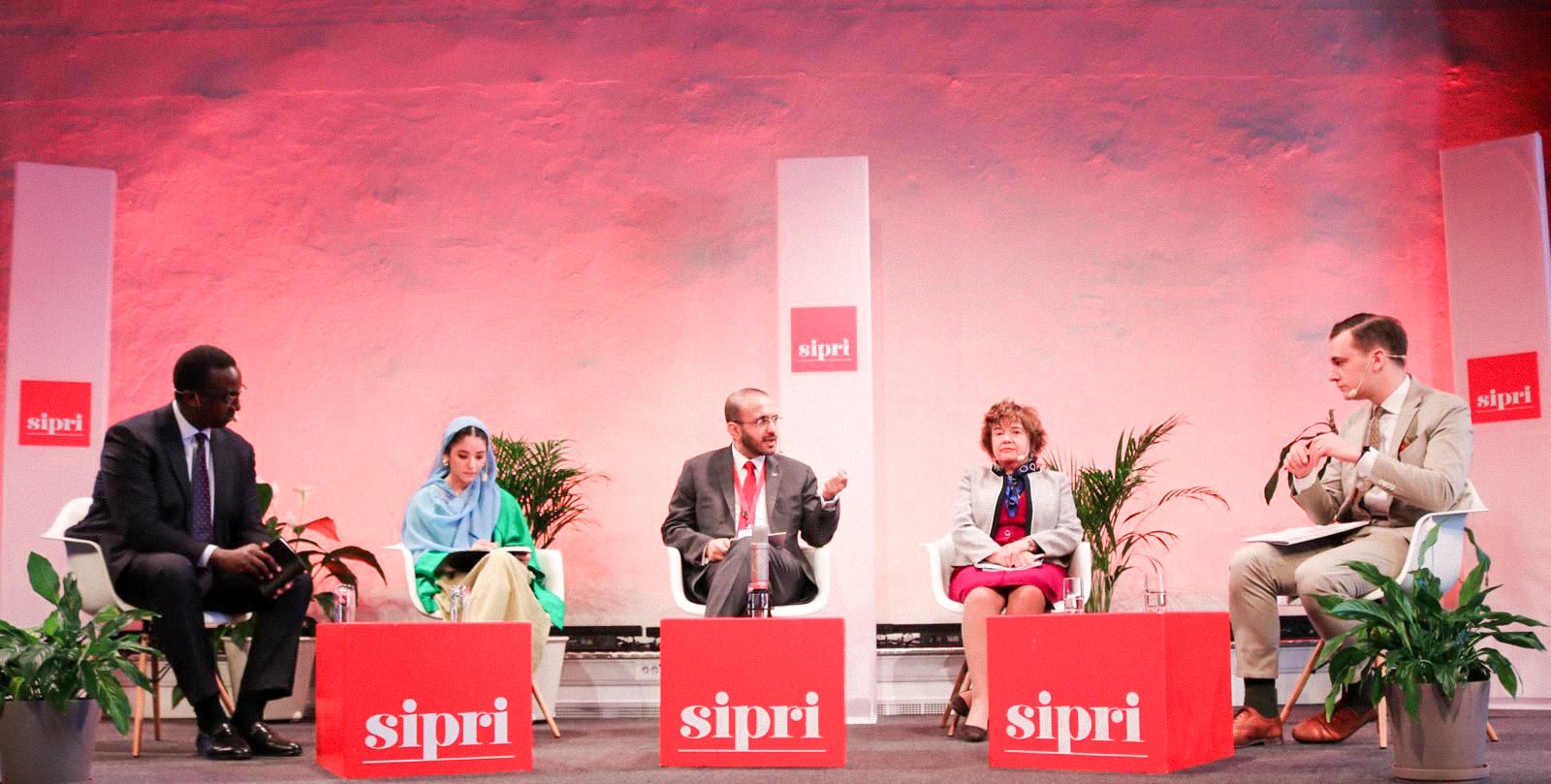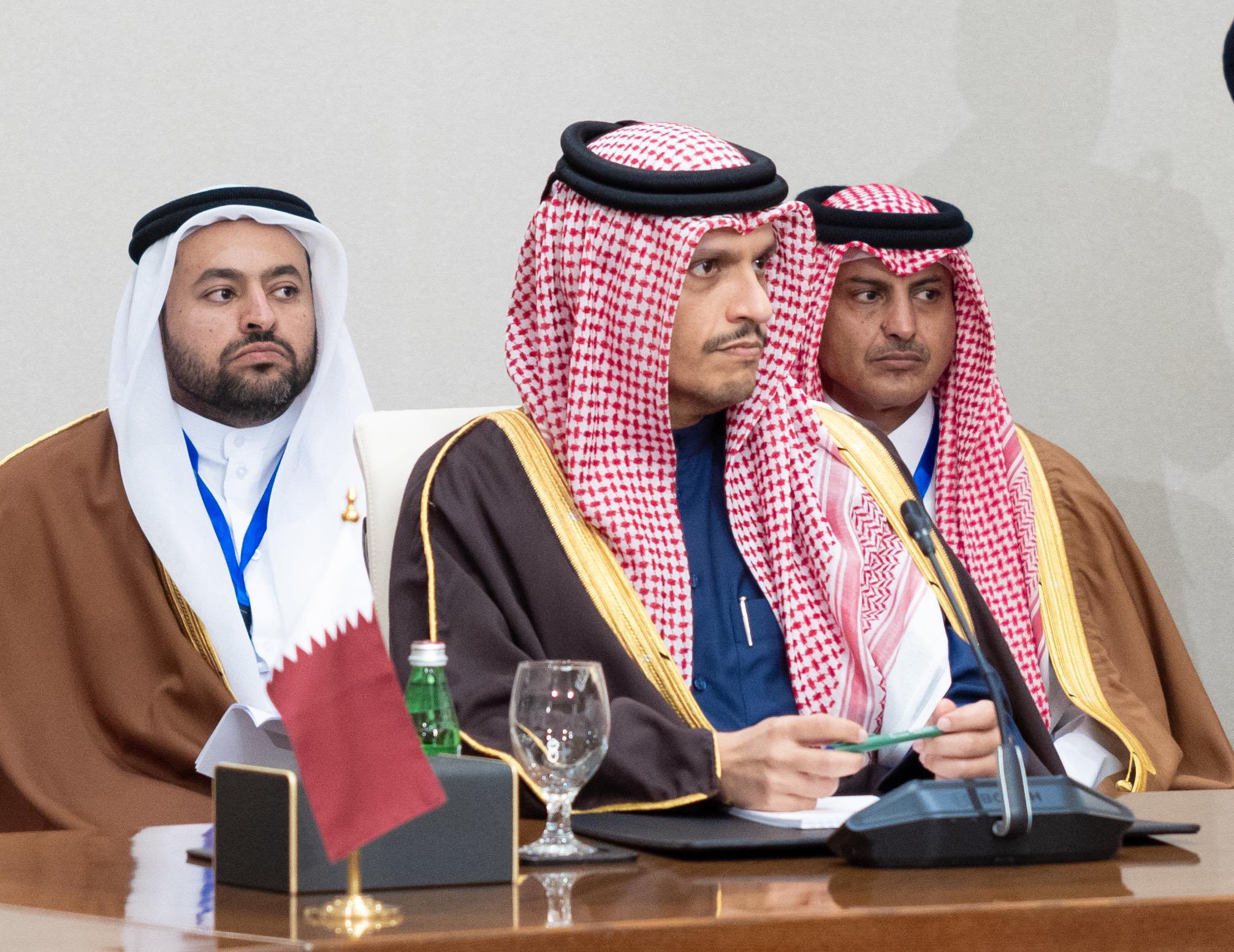Qatar has stood out as a regional diplomatic power with a rich record of mediation efforts.
Qatar’s foreign ministry spokesperson, Majed Al Ansari, delved into the Gulf state’s mediation efforts in critical files globally and regionally on Tuesday during the Stockholm Forum on Peace and Development in Sweden.
The Qatari official spoke at a panel titled “Rethinking Conflict Prevention,” where Doha’s mediation record was under the spotlight.
Al Ansari started his remarks at the panel by highlighting the changing nature of global conflicts and the need to adapt to them. He also stressed the importance of addressing the root causes of conflicts through a holistic mediation approach that addresses the future.
“It is very important for us to understand the changing nature of conflicts and the multifaceted way we should be approaching it. It has to do also with the reality that we sometimes try to ignore, but they come back and become the main catalyst for further conflict,” Al Ansari said.
Al Ansari pointed to the fact that Qatar’s constitution is the only one with the word “mediation” in its foreign policy, placing great emphasis on the country’s key diplomatic role in resolving conflicts and political crises.
Outlining the key factors that ensure Qatar’s success in mediation, Al Ansari noted that Qatar invests “in taking the political responsibility of the mediation, which also means taking on the political cost of being a mediator.”
When explaining the “cost”, he referred to the blame the mediator often faces for the mediation process as it “cannot be fathomed that a country from the Middle East” is playing such a role “without ulterior motives.”
While Al Ansari did not elaborate on the matter, it came as Qatar continues to face criticism from Israeli officials and some American diplomats over its crucial mediation role between Israel and Hamas.
The most prominent incident was in January when Israeli Prime Minister Benjamin Netanyahu described Qatar’s mediating position as “problematic” in leaked audio recordings. Netanyahu then said he stood by his inflammatory remarks.
The criticism came despite Qatar’s ability to reach a deal last year that saw the release of 109 captives from Hamas.
“We have paid it [the cost] in the past and we are paying it right now when it comes to the image of our country, the campaigns launched against our country and the pressure that we face. It would’ve been much easier for a country like Qatar to shy away from these roles,” Al Ansari explained.
The Qatari official also highlighted other factors the Gulf diplomatic heavyweight takes into account, which include its strategic engagement.
Al Ansari said that strategic engagement ensures a holistic, long-term approach to conflicts and crises globally. This is in addition to another major factor, which is “tactical neutrality.”
He used the current mediation between Israel and Hamas as an example of such neutrality.
“It is no secret that Qatar is a pro-Palestinian state, it has always been a big advocate for the Palestinian cause, but we are able to sit on the table and represent Israeli and Palestinian interests at the same time,” he said.
Qatar does not hold diplomatic ties with Israel and has hosted the Hamas political office since 2012 in response to a request from the United States.
The diplomatic efforts of Qatar, Egypt and the U.S. are ongoing in hopes of reaching a deal between Israel and Hamas.
Qatar’s record of mediation efforts
Qatar has stood out as the region’s diplomatic power with a rich record of mediation efforts.
“Peace facilitation in the Middle East was always either a subcategory of international efforts or a way for countries within the region to talk about their problems, but it was never seen that peace facilitation can come out of the Middle East,” Al Ansari said.
Aside from its current role in Gaza’s ceasefire efforts, Qatar has played a significant role in other fields regionally and globally.
Qatar is currently a member of a Quintet Group aimed at resolving Lebanon’s political impasse. The group includes Saudi Arabia, Egypt, the United States, and France.
The Gulf state previously assumed a major diplomatic role in Lebanon in 2008, when it held talks that resulted in an agreement between the Lebanese government and Hezbollah following an 18-month political crisis.
In January 2023, Qatar attempted to host peace talks between the Democratic Republic of Congo and Rwanda to resolve the ongoing tensions between both sides. However, reports at the time claimed that the meeting was cancelled due to a no-show by DRC’s leader.
Qatar also led mediation efforts between at least 50 Chadian sides in 2022, which resulted in the Chad Peace Agreement following months of negotiations in Doha.
In 2021, Qatar led a major role in the Kenya and Somalia reconciliation following a dispute that saw the latter accuse Nairobi of interfering in its internal affairs.
In 2009, Qatar sponsored the signing of the “Doha Accord”, also known as the “Darfur agreement”, between Khartoum and N’Djamena.
The agreement, co-sponsored with Libya, was signed amid tensions between Sudan and Chad in 2008 when both countries accused each other of supporting insurgent groups and rebel attacks inside their territories.
Beyond Africa, Doha stepped in last year as an interlocutor between the U.S. and Iran in an effort to revive the 2015 nuclear deal, formally known as the Joint Comprehensive Plan of Action (JCPOA).
This resulted in a historic deal on September 18, 2023, which saw the release of five Iranians and five Americans as well as the unfreezing of $6 billion in Iranian assets overseas.
Qatar also emerged as an interlocutor between the U.S. and Venezuela last year.
On December 21, 2023, Qatar’s mediation resulted in a prisoner exchange deal of 11 prisoners between the U.S. and Venezuela. The swap marked the largest release of US prisoners in Venezuela’s history, according to the Associated Press.
Most notably, the Gulf state managed to bring the former Afghan government and the Taliban to the table of negotiations in 2020 to reach a peaceful settlement.
During the same year, Qatar brought the U.S. and the Taliban together following more than a decade of war, resulting in the Doha Agreement.
Qatar continued to hold mediation talks until the last stretch, just days before the Taliban captured Kabul in 2021.
In the wake of the Taliban’s takeover, Qatar led history’s largest airlift of people and successfully evacuated more than 80,000 Afghans and foreigners from the country. Its efforts in Afghanistan have gained the country the status of the major non-NATO ally in 2022 by the U.S.
Qatar is currently reuniting children and families from Russia and Ukraine who have been separated due to the ongoing conflict.
Last month, Russia and Ukraine reached a deal through Qatar’s mediation over the exchange of 48 children displaced by the war. A total of 29 children will head to Ukraine and 19 to Russia.
Qatar had previously expressed its openness to facilitate dialogue between rivals Russia and Ukraine “if asked” by its international partners.
Prisoner releases
Qatar has also managed to secure numerous prisoner releases over the past decade.
In 2014, Qatar negotiated the release of 13 nuns and 45 United Nations peacekeepers who were held in Syria.
In 2021, the Gulf state helped secure the release of seven Turkish civilians held by Libya’s Khalifa Haftar’s forces for two years.
Within the same year, Qatar helped with the release of American journalist Danny Fenster from Myanmar’s prison after being sentenced to 11 years for incitement.
In 2023, Qatar helped facilitate the release of Paul Rusesabagina, widely known as the “Hotel Rwanda hero,” from Rwandan prison.
In February, Qatar’s mediation efforts led to the release of an Austrian citizen detained in Afghanistan, Herbert Fritz.
This came after Qatar assisted in the release of U.S. aid worker Safi Rauf and his brother, Anees Khalil, a British citizen, from the Taliban in 2022.







